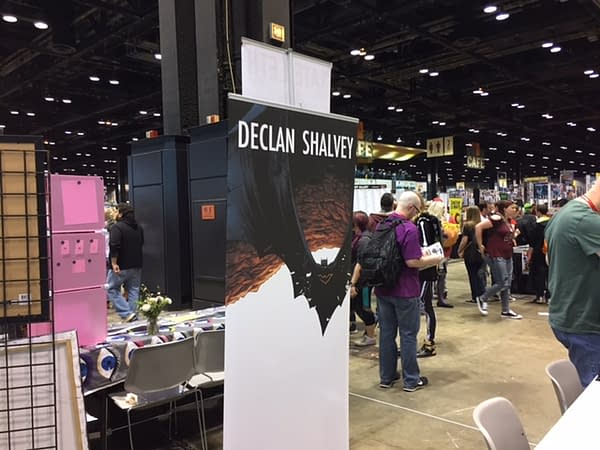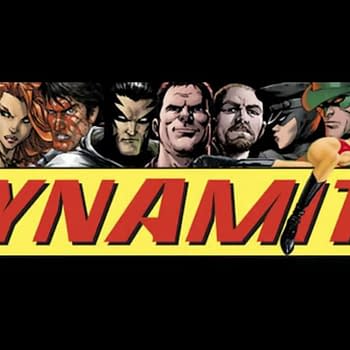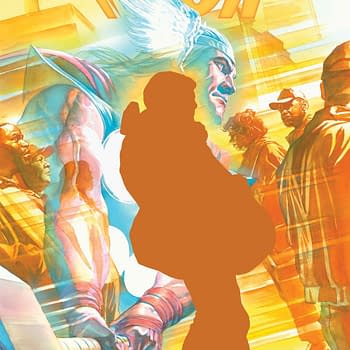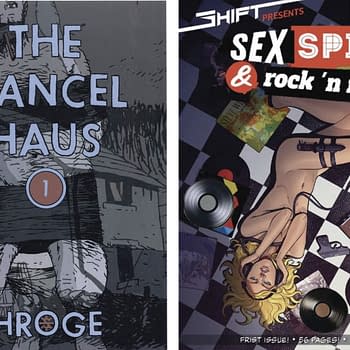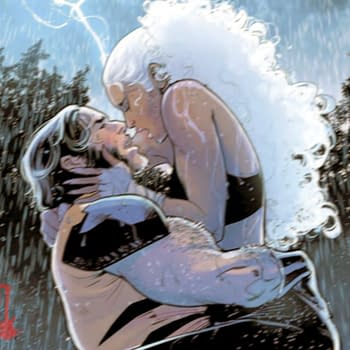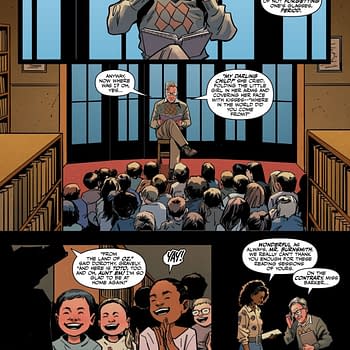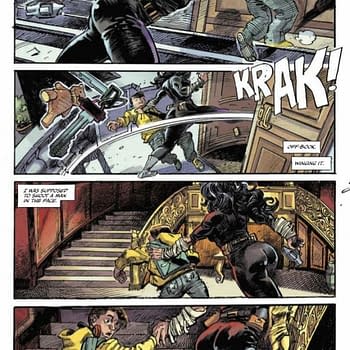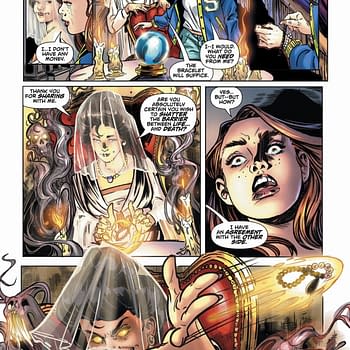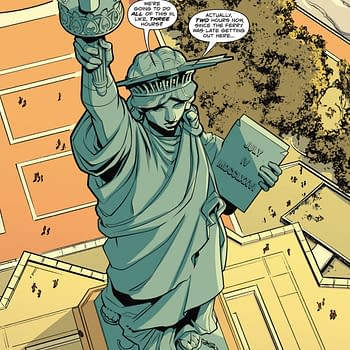Posted in: Comics | Tagged:
The #ArtCred Panel, Late, Of Course, From C2E2 – With Declan Shalvey, Jordie Bellaire, Kieron Gillen, Chip Zdarsky, Jason LaTour And Erica Henderson
Don't you have it when you go to a comic convention for a website, and then realise you forgot to send a bunch of panel reports, sitting in your Out tray? That's what happened to David Pierce at C2E2. But that's okay David, better late than never! We'll be running these through the next couple of days…
David Michael Pierce writes,
#ArtCred – a hashtag movement started by Declan Shalvey to highlight the trend in comics for artists not to get equal credit with writers. Also #ArtCred? A panel with Shalvey and friends discussing the trend.
It was clear from the start that this was not planned by a group used to hosting panels. The panel stage was than it needed to be and the panel itself lacked the focus you find in a more organized presentation. But despite this, it was a very entertaining and informative panel from the audience perspective, even if the overall experience didn't narrow in on the issue at hand. Or perhaps, more accurately, the issue at hand may not be as narrow as the simple description at the start of the panel.
In addition to Shalvey, the panel featured guests whose experience brought different viewpoints to the process. Jordie Bellaire was on the panel representing the viewpoints of creators other than artists and writers; Kieron Gillen was there as someone who solely writes; Chip Zdarsky and Jason LaTour as artists/writers; Erica Henderson as someone who is solely an artist; and Oliver Sawa from the AV Club as a critic/member of the press.
Shalvey opened up the panel – well, no. Zdarsky opened up the panel by going to the audience microphone and complaining the Wolverine's actions in the latest issue of X-Men were inconsistent with something he said in Uncanny 164. The joke, the panel's reaction, and the audience reaction set the tone for the fun, informal nature of the panel.
The actual panel began with Shalvey describing the phenomenon and providing several examples he's found demonstrating the phenomenon. Shalvey said he started the movement not because he likes public shaming, but because drawing attention to the issue is one way to counteract the problem. Shalvey then asked the only real formal question of the panel – why did the panelists think artists don't get enough credit. The question prompted a variety of answers that led to the free flowing discussion that followed.
Henderson stated that the since creators have no ownership stake in Big Two characters, it's easy to treat the creators as interchangeable. Zdarsky followed that by semi-jokingly stressing that he's happy the writers get credit at all and that he was surprised that praise for Grant Morrison's All-Star Superman (one of the examples Shalvey used) didn't call the book DC's All-Star Superman.
Sawa stated that he felt part of the problem was people writing about comics being far more familiar with writing, making them more comfortable discussing writing than art. In addition, he felt it was easier for many writers to criticize writing than art, especially if the artist on a book remains the same. In those cases, the only thing that really changes from month to month is the story, making it easier to discuss.
LaTour spoke of the issue as a more culturally systemic problem. In a society that treats art and comics solely as entertainment, artists become disposable. LaTour echoed something Sawa said about the need for more, and better, art education.
Gillen came back to the question later, mentioning logistics as a factor in promotion of the writer over the artist. Writers, he pointed out, are working on multiple books at once, often times more than one book for the same company. Artists very seldom are working on more than one book at a time. Therefore, promoting a writer's work on one book can actually promote multiple books from the publisher.
What followed was a brief group discussion about the fact that even when artists are credited, they aren't necessarily credited with more than the art. That is, ideas originate with the writer and the artist is just there to bring forth the writer's vision.
Gillen mentioned a couple of factors. He stated that the symbiotic nature of his working relationship with Jamie McKelvie made it difficult for anyone to say with any certainty who is responsible for what other than the basic tasks of writing/art. Henderson added that any strong writer/artist relationship (like hers with Ryan North) will have this dynamic, and that she also had this sort of symbiotic relationship with Zdarsky when they worked on Jughead together. She felt that her and Chip both being artists helped them communicate and share ideas more effectively.
LaTour added that there was a weird dichotomy at play, in that the ultimate goal of the creators working on a book was to create a work that read seamlessly, that had readers experiencing the work as a whole and not as a sum of its individual parts.
But it was Bellaire who spoke most passionately about all these issues. The issue of credit is important for creators farther removed from the public eye (inkers, letterers, colorists) not just due to questions of fairness but because recognition is a driving factor in both page rate and the type of jobs these artists can get. She spoke of creators she has talked with who do not seem to realize their own worth, or did not want a credit because they felt they didn't need a credit or didn't deserve a credit or felt, in the instance of cover credits, that a credit would obscure some of the work they did. You could sense her frustration with these artists, and she made it clear that these sorts of attitudes hurt all artists.
Sawa followed on to this train of thought by mentioning times he has reached out to artists for email interviews. In one instance he submitted two questions to an artist, and the total word count between the responses to the two questions was 11 words. The panel as a whole agreed with the need for all creators to be willing to promote themselves, even if they were inclined not to do so.
The panel concluded with a brief Q&A, with one audience member pointing out that this emphasis on the writer happens in advertising as well, with the copywriter getting far more credit than the artist. Another audience member asked what readers can do to promote artists. LaTour responded, and the panel agreed, that publishers make decisions based on profit. Readers voting with their dollars have a far greater impact on publisher decisions than any other method. With that the panel ended, and while it could have been more focused (I've attempted to make this write-up less confusing than the panel itself was), it was an entertaining and interesting panel.


